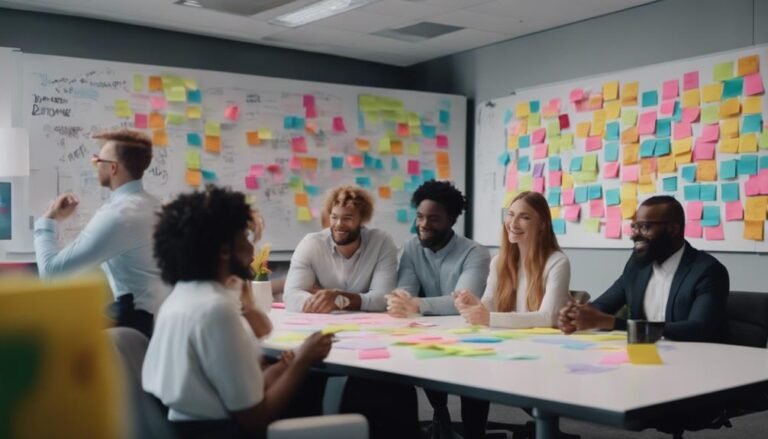Empowering Nonprofits: Structuring Inclusion for Impact
Within the landscape of nonprofit organizations, the concept of structuring inclusion for impact holds significant weight in fostering a cohesive and high-performing environment.
By strategically implementing inclusive practices, nonprofits can not only enhance employee engagement but also drive sustainable outcomes that resonate within the community they serve.
The intricacies of empowering nonprofits to prioritize inclusivity, meritocracy, connection-building, mentorship, and idea integration unveil a realm of possibilities for organizations aiming to leave a profound mark on both their internal culture and external stakeholders.
Key Takeaways
- Inclusive practices drive high performance and employee engagement in nonprofits.
- Structured meritocracy fosters clear processes and rewards for personnel decisions.
- Connecting staff through mentorship and relationships enhances mission alignment.
- Idea integration empowers innovation by valuing diverse perspectives and staff contributions.
Inclusive Practices for Nonprofits
In fostering a culture of inclusivity within nonprofits, adopting structured and sustainable inclusive practices is paramount for driving employee engagement, retention, and organizational performance. Organizations must embrace organizational change to embed inclusive practices at all levels.
Peer support, characterized by mutual respect and collaborative efforts, plays a crucial role in fostering inclusivity. Research has identified 17 key practices for creating inclusive workplaces, emphasizing the need for prioritizing practices that promote high-performance inclusivity.
Nonprofits should empower staff to shape inclusivity through personal interactions, creating a supportive environment that values diversity. By prioritizing peer-led practices and embracing organizational change, nonprofits can cultivate a culture of inclusivity that enhances employee engagement and contributes to overall organizational success.
Meritocracy and Personnel Decisions
When considering meritocracy and personnel decisions in nonprofits, a systematic and transparent approach to evaluating and rewarding performance is essential for fostering a culture of fairness and accountability. Objective evaluation criteria and performance recognition mechanisms play a pivotal role in ensuring that employees are rewarded based on their contributions and achievements. By implementing clear frameworks for assessing performance and linking it to tangible rewards, nonprofits can motivate their staff, enhance productivity, and retain top talent. Celebrating accomplishments through formal recognition not only boosts morale but also reinforces the principles of meritocracy within the organization. Investing in mentorship and leadership opportunities further solidifies the commitment to objective decision-making and talent development.
| Objective Evaluation | Performance Recognition |
|---|---|
| Clear performance metrics | Formal recognition programs |
| Transparent evaluation processes | Awards for outstanding contributions |
| Regular feedback mechanisms | Public acknowledgment of achievements |
| Alignment of goals with assessment | Employee of the month/year recognitions |
| Training for fair evaluation practices | Peer-nominated awards |
Building Connection Opportunities
To enhance organizational cohesion and foster a culture of collaboration, nonprofits must strategically design and implement connection opportunities that facilitate relationship-building among staff members.
Team building activities and networking events can create avenues for employees to interact outside of their regular work tasks, fostering a sense of camaraderie and teamwork.
Encouraging cross-department collaborations and organizing virtual coffee chats can break down silos, promote knowledge sharing, and strengthen relationships across different areas of the organization.
These initiatives are essential for building trust, enhancing communication, and aligning staff towards common goals.
Mentorship for Development
Enhancing professional growth and fostering a culture of continuous learning, mentorship plays a pivotal role in guiding employees towards achieving their full potential within nonprofit organizations. Leadership growth is nurtured through mentorship, where experienced individuals provide professional guidance, support, and feedback to help employees develop key skills and competencies.
Formal structures that promote mentorship at various levels within nonprofits are essential for creating a conducive environment for talent development. Investing in mentorship programs not only benefits individual staff members but also contributes to the broader sector by cultivating a pool of skilled and motivated professionals.
Encouraging Idea Integration
Encouraging a culture of openness to diverse perspectives and ideas is fundamental in fostering innovation and driving sustainable growth within nonprofit organizations. By creating spaces for idea sharing sessions and innovation workshops, nonprofits can harness the collective intelligence of their teams. The table below illustrates how idea integration can be strategically implemented to maximize its impact:
| Strategies | Description | Benefits |
|---|---|---|
| Hosting ideation sessions | Facilitate brainstorming and collaboration among staff members. | Generates a pool of creative ideas and solutions. |
| Recognizing contributions | Acknowledge and appreciate staff members who contribute unique perspectives. | Motivates staff to actively participate and share ideas. |
| Implementing feedback loop | Establish a system for collecting, analyzing, and acting upon staff feedback. | Enhances continuous improvement and idea refinement. |
Structuring Inclusion for Impact
Fostering a culture of structured inclusion within nonprofit organizations is imperative for driving sustainable impact and maximizing organizational effectiveness. Implementing impactful strategies that prioritize sustainable practices and promote employee engagement is key to achieving organizational cohesion.
By embedding inclusive practices at the core of operations, nonprofits can enhance employee satisfaction, retention, and overall performance. Research has identified various practices, such as peer-led initiatives and inclusive decision-making processes, that contribute to creating a more inclusive work environment.
Prioritizing key practices that foster inclusivity and empower staff to shape organizational culture through personal interactions can lead to long-term positive outcomes for both the organization and the communities they serve.
Conclusion
In the intricate tapestry of nonprofit organizations, the threads of inclusivity, meritocracy, connection, mentorship, and idea integration weave together to create a strong foundation for impactful change. By embracing these structured practices, nonprofits can empower their employees to drive success and foster a culture of belonging.
Like a symphony of diverse voices coming together in harmony, structured inclusion in nonprofits propels them towards a brighter, more inclusive future.







